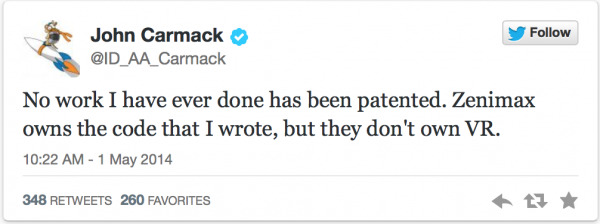ZeniMax, Oculus, And John Carmack: VR Gets Serious
When John Carmack left Id software for Oculus, part of the issue surrounded parent company ZeniMax blocking him from what he wanted to do, which was continue some of his popular franchises on Oculus. those games, like Wolfenstein, were practically beging for virtual reality, but ZeniMax wasn't interested. This morning, ZeniMax is claiming Oculus and Carmack violated a previous agreement, essentially entitling them to a piece of the virtual pie.
It seems that just ahead of Oculus' debut at E3 in 2012, Id and Oculus honchos signed an agreement with ZeniMax. Part of this agreement governed how Carmack's work on virtual reality while still an Id employee would affect the two companies. Carmack never signed the agreement, and left Id formally in November of 2013.
Re/Code has obtained a copy of the agreement, which states Oculus "shall not acquire hereunder any right whatsoever to any proprietary information ... nothing in this agreement is intended or shall be construed as a transfer, grant, license, release or waiver of any intellectual property rights in any proprietary information." Essentially, the agreement states that everyone agrees that everything belongs to the companies, and that's that. Carmack tweeted the following, which can be construed as his take on the IP in question as well as his time with ZeniMax:

It should also be noted that Carmack was not specifically named in the agreement. The issue at heart is the Intellectual Property surrounding Virtual Reality he may have had a hand in while with ZeniMax. Under the agreement, ZeniMax believes they have a financial interest in anything that was developed by Carmack during his time there, save for an Aerospace side project he was working on.
As Oculus was recently purchased by Facebook, and has been seeding units to Developers for a price, ZeniMax is now interested in what they can gain from this. It's trolling at its finest, wherein they will possibly have legal recourse to seek damages, as Carmack was technically an employee when he was technically working on virtual reality. Carmack, to his credit, is fighting the good fight, here. What we're left with is a fight over Intellectual Property, which is the messiest battle possible for virtual reality.
Source: Re/Code
